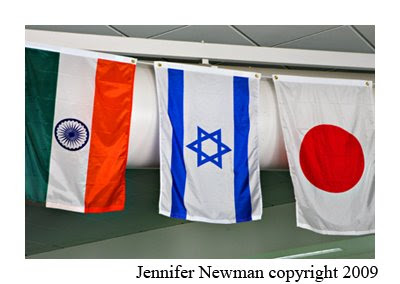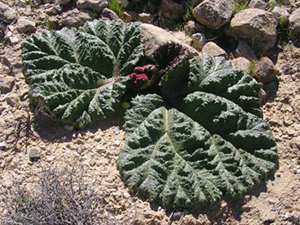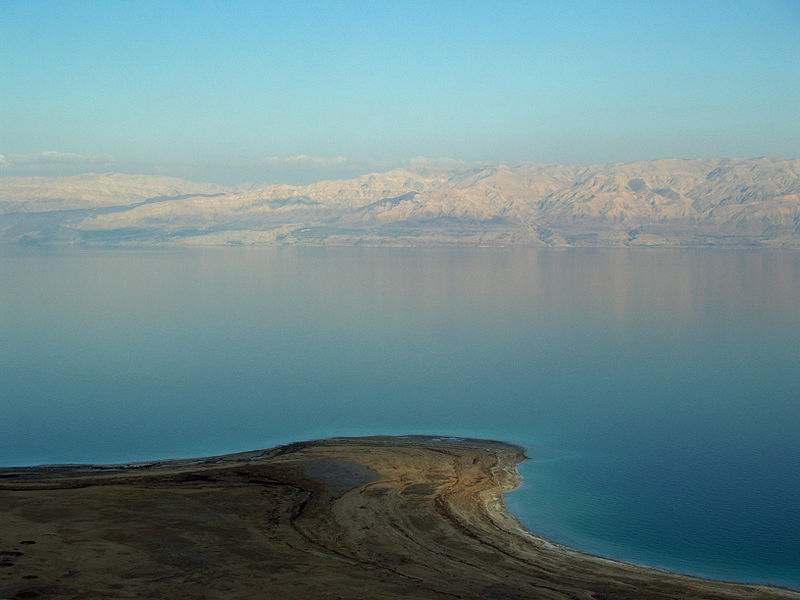 Whenever I think of them, I can’t resist that Homer Simpson-style exclamation “Mmmm, strawberries….” But do strawberry fields and the desert go together? I guess so, surprising as it is! Here are some details for the technically inclined:
Whenever I think of them, I can’t resist that Homer Simpson-style exclamation “Mmmm, strawberries….” But do strawberry fields and the desert go together? I guess so, surprising as it is! Here are some details for the technically inclined:General description of the method: Strawberries are grown in detached, small volume plastic foam containers in beds hanging on the greenhouse construction above the soil surface. The container is placed on a drainpipe, which enables drainage and collection of the drained water. The greenhouses are highly computerized and powered with solar energy.
Advantages of the method: Extremely high yields, optimal utilization of greenhouse area, maximum work convenience, relatively disease-free crops, relatively low costs, collection and recycling of drainage water.
Disadvantage of the method: The greenhouse construction requires special support.
And here are some pictures for the visually/romantically inclined:



Golda Meir once said, “We do not rejoice in victories. We rejoice when a new kind of cotton is grown and when strawberries bloom in Israel.“ And so they grow in the sand just about year round. I think I know exactly how Golda felt.
Please visit the web site of The Negev Foundation to learn more about sustainable desert development efforts.

 Minister of Industry, Trade and Labor Benjamin Ben-Eliezer has instructed the Chief Scientist Dr. Eli Opper and Investment Promotion Center director Hezi Zaieg to give priority to cleantech.
Minister of Industry, Trade and Labor Benjamin Ben-Eliezer has instructed the Chief Scientist Dr. Eli Opper and Investment Promotion Center director Hezi Zaieg to give priority to cleantech.  The largest and most ambitious "green" project in Israel – and ranking up with the top urban reclamation projects worldwide – gets a huge boost Sunday night, when the lighting system at Sharon Park will be turned on for the first time. But the lights won't use power from the electrical grid. The system will instead be powered by the recycled trash upon which Sharon Park is being built, with bio-gasses that have been festering on the site for decades to be used to power the lights.
The largest and most ambitious "green" project in Israel – and ranking up with the top urban reclamation projects worldwide – gets a huge boost Sunday night, when the lighting system at Sharon Park will be turned on for the first time. But the lights won't use power from the electrical grid. The system will instead be powered by the recycled trash upon which Sharon Park is being built, with bio-gasses that have been festering on the site for decades to be used to power the lights. If you drive a hybrid, you are undoubtedly paying less at the pump than your SUV driving counterparts. Here in the US, that is a tremendous incentive. But what if Uncle Sam also gave you a tax break just because you're giving the planet a pollution break? That's the intention of the Israel Finance Ministry--offering special discounts on hybrids and in turn adding additional taxes and duties on gas guzzlers. The Ministry hopes that this will encourage Israelis to love the Earth even more by buying eco friendly cars and hopefully dumping their older, less efficient, more pollution inducing cars. Let's hope it works, keep it green, Israel!
If you drive a hybrid, you are undoubtedly paying less at the pump than your SUV driving counterparts. Here in the US, that is a tremendous incentive. But what if Uncle Sam also gave you a tax break just because you're giving the planet a pollution break? That's the intention of the Israel Finance Ministry--offering special discounts on hybrids and in turn adding additional taxes and duties on gas guzzlers. The Ministry hopes that this will encourage Israelis to love the Earth even more by buying eco friendly cars and hopefully dumping their older, less efficient, more pollution inducing cars. Let's hope it works, keep it green, Israel! A special thanks to Kendall Toyota in Miami, FL for letting me use this red Prius in the picture as a model for this post. They even have an Israeli flag among their flag display in their showroom! Please check out
A special thanks to Kendall Toyota in Miami, FL for letting me use this red Prius in the picture as a model for this post. They even have an Israeli flag among their flag display in their showroom! Please check out  Ben-Gurion University of the Negev (BGU) researchers have developed a new, highly energy-efficient window technology, featuring two reversible panes that will save energy all year round in homes and office buildings.
Ben-Gurion University of the Negev (BGU) researchers have developed a new, highly energy-efficient window technology, featuring two reversible panes that will save energy all year round in homes and office buildings. You gotta love the Israeli Defense Forces (IDF)...they are like no other army in this world. But to be fair, Israel is like no other country in the world -- their military is a big part of the spirit of the nation, a nation that prides itself on planting trees as a national pastime that is essentially, the heart and soul of the nation.
You gotta love the Israeli Defense Forces (IDF)...they are like no other army in this world. But to be fair, Israel is like no other country in the world -- their military is a big part of the spirit of the nation, a nation that prides itself on planting trees as a national pastime that is essentially, the heart and soul of the nation. Researchers from Tel Aviv University say they have found a novel, cheap, effective, and reliable way to help predict the intensity of the next big flood, using common cell phone towers across the United States. Their model, which analyzes cell phone signals, adds a critical component to weather forecasting never before available.
Researchers from Tel Aviv University say they have found a novel, cheap, effective, and reliable way to help predict the intensity of the next big flood, using common cell phone towers across the United States. Their model, which analyzes cell phone signals, adds a critical component to weather forecasting never before available. The world’s first "self-watering" plant has been discovered in Israel’s Negev desert – one of the driest regions on earth. The Desert Rhubarb can hold 16 times more water than its rivals and has developed a unique ability to effectively water itself in its barren habitat.
The world’s first "self-watering" plant has been discovered in Israel’s Negev desert – one of the driest regions on earth. The Desert Rhubarb can hold 16 times more water than its rivals and has developed a unique ability to effectively water itself in its barren habitat.